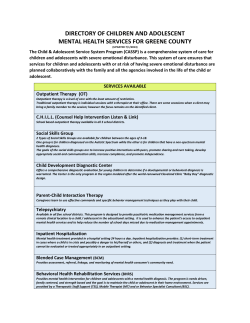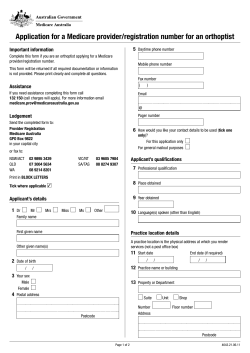
Document 66212
------------------------------------------------- SEPTEMBER 15, 2013 --------------------------------------------------- Parent Partner Initiative Charges Ahead at Akron Children’s Hospital For Jill, Mandi, Regina, Deb and Edythe, no family is too troubled for the Parent Partners to handle. This team of parent-to-provider liaisons and their Case Manager have been trained, both professionally and throughout their own unique life experiences, how to handle the ups and downs of children in the hospital for a Behavioral Health problem. Having been parents or guardians themselves of children with Behavioral Health diagnoses, they uniquely perform the role of the Parent Partner who helps ease the minds of parents while their child is in the inpatient unit. Their goal is to achieve smooth communication with their child’s provider and help empower the parent to be capable of handling their child when they leave the hospital. Today they work side-by-side with providers on the inpatient unit to help the parent feel like a leader in their child’s care. The pathway to acceptance by the providers on the unit was not immediate though. Initially the Parent Partner Initiative faced challenges integrating into the Behavioral Health team on the inpatient unit. No one had ever heard of a Parent Partner before. Not only did they have to find their place within the highly structured and monitored unit, but it took time and finesse to establish themselves as a useful resource for the providers. “We had to earn the providers’ trust by showing them that we actually could positively impact their patients and families, that we could give parents the time that the providers may not have, and that the senior leadership was behind us if anything goes The Parent Partner Initiative team at wrong,” says Jill Levin, one of the four Parent Akron Children’s Hospital Partners at Akron Children’s Hospital. By utilizing their own Case Manager, Edythe, the Parent Partners are able to connect families with outside resources when their interactions reveal unmet community or medical needs, without overwhelming current Behavioral Health Social Workers with the added volume. Since the unit has accepted and leveraged the value of the Parent Partner Initiative, the team members have managed to become a point of contact for both the family and the provider when they need additional support in difficult, emotional, or you-name-it situations involving their child’s inpatient stay. “Families are asking for us by name before discharge, it’s a really amazing feeling,” says Deb Jackson, another Parent Partner. The program assisted 107 new families in the month of August. • • • HCIA Program News: Parent Partners Triple Aim Metrics Spotlight: Cost Dates to Watch • HCIA Team Member of the Month o Akron Children’s Hospital o Nationwide Children’s Hospital HCIA Program News: Parent Partner Initiative Provided are two real-life stories of the impact made on patients of the HCIA Parent Partner Initiative in Columbus and Akron: Nationwide Children’s Hospital: A Parent Partner (PP) was linked with the mother of a patient seen in the emergency department due to combative behavior and substance use. While in the ED, the mother became upset and a physical altercation occurred between the mother and her daughter, who then expressed suicidal thoughts. During the patient’s first outpatient visit, the situation between mother and daughter escalated again. The PP provided support to the mother through phone calls, during which the mother expressed • September 25, 2013: CMMI Project Officer embarrassment about the relationship between her and her daughter. The PP’s site visit ability to self-disclose her own struggles with embarrassment helped to reduce the mother’s sense of stigma. Once this occurred, the PP was able to help the • September 30, 2013: HCIA Advisory mother explore the best next steps regarding her daughter’s treatment. As a Council meeting #3 result, significant improvements were noted at the next outpatient appointment visit. The mother was able to demonstrate new communication skills with her • October 31, 2013: Quarterly Report Due daughter’s treatment provider. The family is now participating in outpatient therapy and report that their family communication has improved. Later on, the outpatient clinician assigned to their case sent an email to the entire treatment team, praising the PP for her progress with the family. This example highlights how parent partners are able to connect with families in ways that clinicians may be unable to. Akron Children’s Hospital: The PP established a good rapport with the father of a teen admitted to the inpatient unit for psychosis and inappropriate sexual behavior. While on the unit, the PP provided support and empathy to the father, who was overwhelmed and bewildered by his son's behavior. PP helped him to reframe the situation, encourage him to see himself as a capable parent and take initiative in getting help for his son. The father appeared to become more confident by the end of his son's stay. After discharge, the PP talked with the father once and learned son was "so much better" on the medication, his "expression even looked different" and he was much more cooperative. In following weeks, the PP left several messages to follow up (the PP intervention is approximately 21 days). One month following discharge, the father called the PP to share that his son had run out of medication and asked for help to see a psychiatrist and acquire necessary medication. The PP then referred the family to the Behavioral Health initiative Case Manager (CM). The CM assisted the father in getting an appointment and medication. Without contacting the PP, the son would have relapsed and most likely returned to the hospital for care. The PP program provided needed support and resources to the father to appropriately care for his son. Triple Aim Metrics Spotlight: Cost – Nationwide Children’s Hospital HCIA MONTHLY | 2 The project described was supported by Funding Opportunity Number CMS-1c1-12-0001 from Centers for Medicare and Medicaid Services, Center for Medicare and Medicaid Innovation. Its contents are solely the responsibility of the authors and do not necessarily represent the official views of HHS or any of its agencies. HCIA Feature: September 2013 Team Member of the Month Michelle Dickstein, MPH Population Health Project Coord. Akron Children’s Hospital Rebecca Baum, MD Behavioral Health Clinical Lead Nationwide Children’s Hospital What is your role with HCIA? I am the Population Health Management Project Coordinator over multidisciplinary team efforts to develop and implement multiple initiatives related to Akron Children’s CMMI Health Care Innovation Award. Initiatives include Behavioral Health, Prematurity Prevention and Children with Complex Medical Needs. About Michelle: I am originally from the Philadelphia area and moved to Akron about 4 years ago. I joined the Akron Children’s Hospital team in February and it has been a wonderful experience! Interesting fact: I’m an outdoors adventure lover. I biked, hiked and tent camped my way through Israel. I’ve been sky-diving and tent camped in the snow! I would like to go hang gliding. Strangest food you’ve ever eaten: Crocodile. It tasted a little like chicken. What was the last concert you attended? I saw Matchbox 20 & Goo Goo Dolls this summer, and the Cleveland Orchestra the same week. Two very different concerts and crowds! What is your role with HCIA? I am the clinical lead for the Behavioral Health and Telehealth portions of the Health Care Innovation Award. An exciting part of my job is being able to help translate new ideas into practice. Sometimes they’re successful, and sometimes not. We usually learn the most from times they don’t succeed. About Rebecca: I grew up in State College, Pennsylvania and lived most of my life in Pennsylvania until I came to Nationwide Children’s in 2003. My husband is also from State College and we head back to visit family often. My son, now 10, was born in Hershey, PA and not surprisingly loves chocolate! Interesting fact: We also have a dog named Nevus. She has brown and white spots--Nevus means “mole” in medical terms. When I was in medical school, my husband and I joked about getting a chocolate lab and calling it “Nevus.” Several years later when we got our first dog I really didn’t think he was still serious! What is farthest location you’ve traveled? In high school my parents and I went to Egypt. Visit our website for earlier issues of HCIA Monthly and other resources: www.partnersforkids.org/hcia For more information on the Health Care Innovation Award at Nationwide Children’s Hospital or Akron Children’s Hospital, please contact Naomi Makni, HCIA Project Manager at naomi.makni@nationwidechildrens.org HCIA MONTHLY | 3 The project described was supported by Funding Opportunity Number CMS-1c1-12-0001 from Centers for Medicare and Medicaid Services, Center for Medicare and Medicaid Innovation. Its contents are solely the responsibility of the authors and do not necessarily represent the official views of HHS or any of its agencies.
© Copyright 2025















